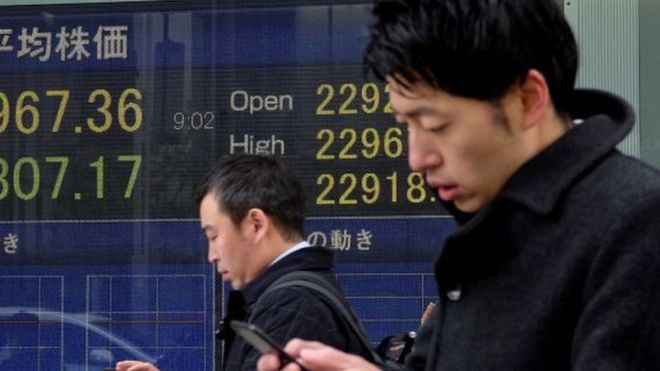Asian markets tumbled on Tuesday as investors dumped stocks following heavy falls in the US in anticipation of higher interest rates.
Japan’s Nikkei 225 index ended the morning session down 5.3% and Hong Kong’s Hang Seng dropped 4.7%.
It comes after the Dow Jones Industrial Average suffered its worst drop in more than six years on Monday.
A strengthening global economy and healthy corporate earnings had spurred world markets to record highs.
But the sell-off began last week after a solid US jobs report fuelled expectations that the Federal Reserve will raise interest rates faster than expected.
“Economic news from the US has been stronger than anticipated,” said David Kuo, chief executive of financial services advisory Motley Fool.
“So, perversely, the market correction has been caused by positive economic news.”
Elsewhere in Asia, South Korea’s Kospi index was down 2.6% and Australia’s benchmark S&P/ASX 200 sank 3%.
US stock futures were pointing to more sharp falls when markets open on Tuesday.
What happened in the US?
On Monday the Dow Jones Industrial Average index tumbled 1,175 points, or 4.6% to close down at 24,345.75.
The decline was the largest in percentage terms for the Dow since August 2011, when markets dropped in the aftermath of “Black Monday” – the day Standard & Poor’s downgraded its credit rating of the US.
The drop on the Dow was closely followed by the wider S&P 500 stock index, down 4.1% and the technology-heavy Nasdaq, which lost 3.7%.
The White House moved to reassure investors saying it was focused on “long-term economic fundamentals, which remain exceptionally strong”.
Why is this happening?
Investors are reacting to changes in the outlook for the American and global economy, and what that might mean for the cost of borrowing.
“The share selling….reflects a higher than previously anticipated interest rate environment,” CMC Markets analyst Michael McCarthy said.
In response to that, investors moved to sell out of stocks and put money into assets like bonds which benefit from higher interest rates.
“This isn’t a collapse of the economy. This isn’t a concern that markets aren’t going to do well,” said Erin Gibbs, portfolio manager for S&P Global Market Intelligence.
“This is concern that the economy is actually doing much better than expected and so we need to re-evaluate,” she said.
What has driven the Dow’s surge?
Will this have long term impact?
Analysts say investors should be prepared for choppier stock markets in the months ahead.
The Dow closed Monday having shed about a third of its gains since Mr Trump took office in January 2017.
It marks a dramatic turnaround from January, when it raced past the 25,000 and 26,000 point milestones in less than a month.
Joel Prakken, chief US economist for IHS Markit, predicts share price gains will be limited over the next two years.
But he added that markets would need to deteriorate more significantly for him to start to worry about the broader economy.
“The difference between this year and last year is we’re going to see more periods of volatility like this as the market reacts to higher inflation,” he said.
“We’re just not used to it because it’s been so long since we’ve had a significant correction.”
What does it mean for investors?
Investors have been bracing for a downturn after months of seemingly unstoppable gains.
Amid the market plunge on Monday, websites for several large money management companies suffered slowdowns or crashes.
Wall Street firms also said they have been fielding calls from people worried about their investments.
BBC
 Q FM Africa's Modern Radio
Q FM Africa's Modern Radio
